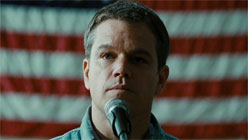Promised Land, Gus Van Sant’s gentle but knowing natural gas drama, is concerned with the tension between long-term environmental costs and short-term financial gain. Set in small-town Pennsylvania and based on a story by Dave Eggers, the screenplay by co-stars Matt Damon and John Krasinski aims for a moral complexity that pays as much attention to economic reality as social responsibility. Though the film eventually caves to sentiment and stereotype, its alert performances and muted rhythms offer much to enjoy in the interim.
As the advance guard of a major energy conglomerate, newly promoted Steve (Damon) and his astringent partner Sue (Frances McDormand) persuade beleaguered farmers to sell drilling rights to land held by their families for generations. A one-time Iowa farm boy, Steve knows that a flannel work shirt and fake folksy charm can soften the most doubtful mark; he also knows that too much information about the company’s gas extraction methods — otherwise known as hydraulic fracturing, or fracking — can derail his sales pitch.
But Steve, as he keeps telling the locals, isn’t a bad guy. He may dispense as many bribes as homilies, but he’s a true believer who sees himself more as savior than salesman. To him, natural gas offers salvation from a disappearing way of life and hard cash for landowners who can barely feed their families. And since farms are doomed, those who cling to their agricultural heritage are practicing “delusional self-mythology,” an argument that many familiar with the economics of today’s farming may see as not entirely far-fetched.
Gliding on Danny Elfman‘s ethereal score and cinematographer Linus Sandgren’s bucolic vistas, Promised Land (unlike Josh Fox’s searing 2010 documentary Gasland) isn’t a howl of anger against corporate callousness. Channeling its environmental concerns through the character of a quietly eloquent retired scientist (Hal Holbrook), the film maintains a homey, humorous tone that only occasionally crackles with anger or disappointment. Most of the pleasure derives from Damon and McDormand’s prickly but pragmatic partnership and, later, Krasinski’s breezy cockiness as Dustin Noble, an environmental activist who woos the locals with sob stories and karaoke. Watching Dustin murder Springsteen’s “Dancing in the Dark” in front of a bar full of applauding farmers, Steve visibly deflates.


